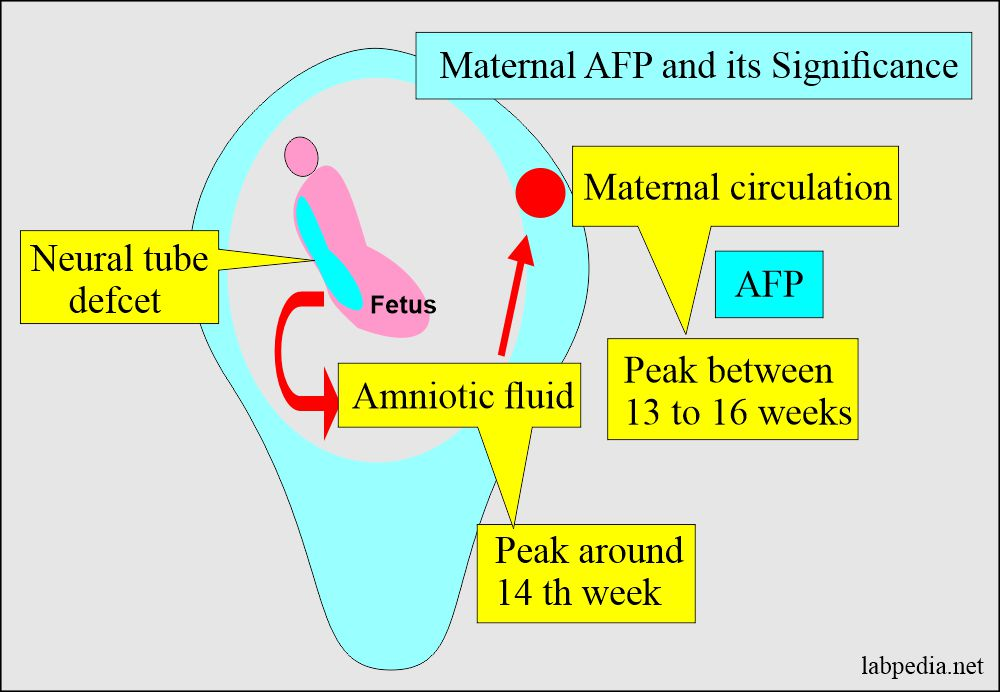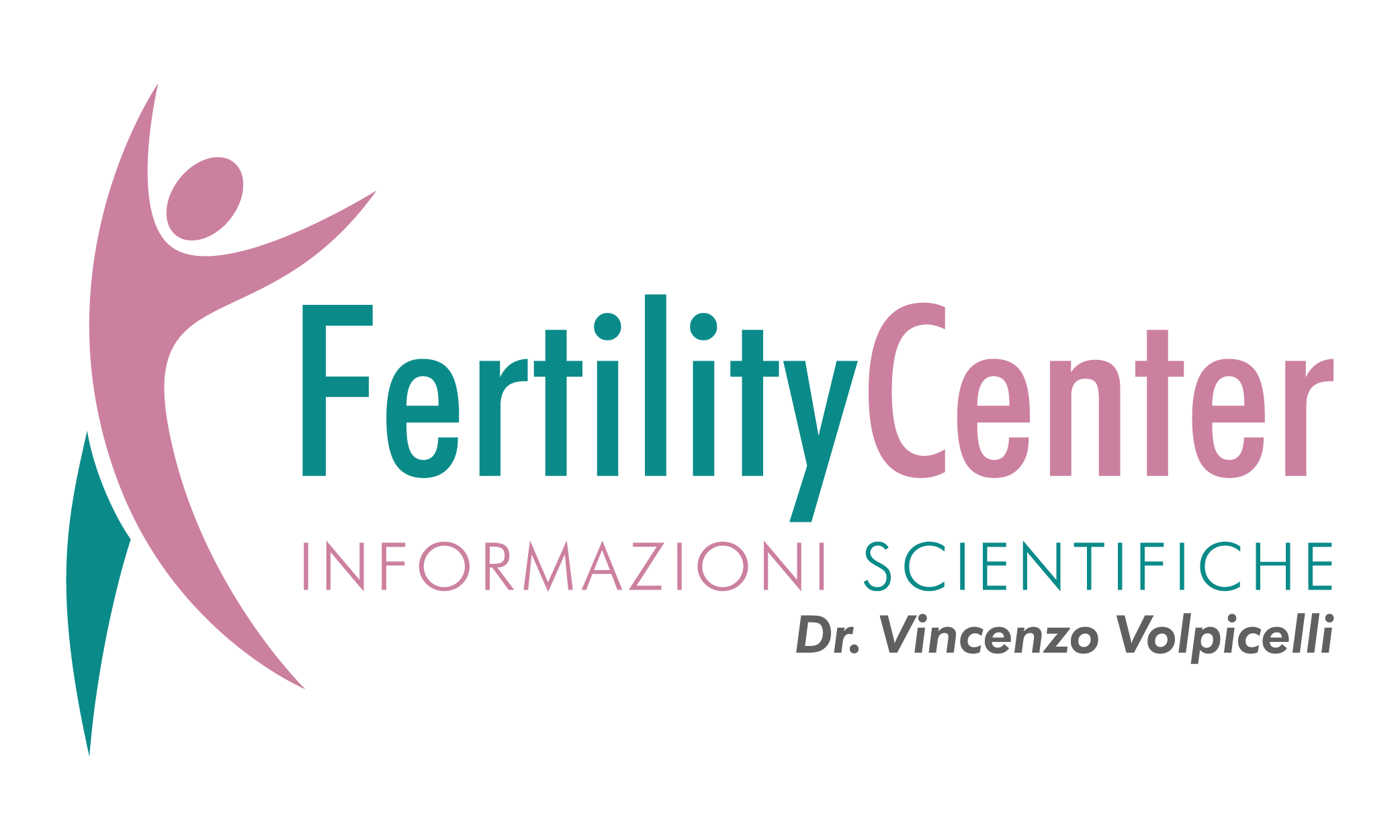L’alfa-fetoproteina (AFP), è una proteina che viene normalmente prodotta dal sacco vitellino e dal fegato fetale a partire dalla quarta settimana di gravidanza; poiché è in grado di passare dal circolo fetale a quello materno è normale osservare alte concentrazioni sieriche materne di AFP durante la gravidanza, in particolar modo nel secondo e terzo trimestre di gestazione.
Dopo la nascita, i livelli di AFP cominciano a scendere sensibilmente, sino a raggiungere – nel giro di 12/24 mesi – i valori caratteristici dell’adulto (<6 ng/mL).
La proteina viene prodotta dal gene AFP situato sul braccio q del cromosoma 4 (4q25). Il gene AFP appartiene ad una famiglia filogeneticamente correlata all’albumina sierica. L’AFP, come l’albumina sierica, mostra affinità di legame relativamente forti per una varietà di ligandi. La differenza più notevole è il forte legame preferenziale degli acidi grassi polinsaturi da parte dell’AFP.
La funzione dell’AFP è sconosciuta, ma studi recenti suggeriscono la possibilità che possa avere proprietà immunoregolatorie e/o possa influenzare la proliferazione e la crescita cellulare.
Concentrazioni sieriche elevate durante la gravidanza vengono considerati suggestivi della possibile presenza di anomalie fetali, soprattutto malformazioni congenite del tubo neurale come la spina bifida e l’anencefalia., l’idranencefalia, l’idrocefalia, la cisti di Dandy-Walker, la malformazione di Arnold-Chiari ma anche in caso di onfalocele e gastroschisi.
Al di fuori della gravidanza negli adulti può essere prodotta in maniera anomala in presenza di specifici tumori, primo fra tutti epatocarcinoma ed anche in caso di cirrosi epatica.
A causa dell’associazione del duplice ruolo regolatore nel cancro e delle attività fetali come potenziatore della crescita o inibitore, l’AFP è stata classificata come una proteina “oncofetale”.
References:
- Gillespie J R, Uversky V N: Structure and function of α-fetoprotein: a biophysical overview. Biochimica et biophysica acta – Protein structure and molecular enzymology.2000;1480,1:41-56
- Nikolić JA.Glas Srp Akad Nauka: Synthesis, structure and function of alpha-fetoproteins and their importance in medicine. Med. 1992;(42):57-73.
- Terentiev AA, Moldogazieva NT: .Structural and functional mapping of alpha-fetoprotein. Biochemistry (Mosc). 2006 Feb;71(2):120-32.
- hemistry and biology of α-fetoprotein. Adv. Cancer Res. (1991)
- alpha-Fetoprotein in cancer and fetal development. Adv. Cancer Res. (1979)
- Bertino G, Demma S, Ardiri A, Proiti M, Mangia A, Gruttadauria S, Toro A, Di Carlo I, Malaguarnera G, Bertino N, Malaguarnera M, and Malaguarnera M. The system in hepatocellular carcinoma and potential new immunotherapeutic strategies. Bio Med Res Int. Review. 2015.
- Abelev GI, Perova SD, Khramkova NI, Postnikova ZA, Irlin IS. Production of embryonic alpha-globulin by the transplantable mouse hepatomas. Transplantation. 1963; 1:174-80.
- Ruoslahti E, Seppälä M. a-Foetoprotein in normal human serum. Nature. 1972;235:161-2.
- González BF, Foncubierta E, Bailén MdeL, Illanes S, Hervías VB, Bartha JL. Maternal and fetal serum transformed alpha-fetoprotein levels in normal pregnancy. Obstet Gynaecol Res. 2009;35:271-76.
- Crandall BF. Alpha-fetoprotein: a review. Crit Rev Clin Lab Sci. 1981;15:127-85.
- Salas ChP, Aguilar RS, Cunningham LL, Castro VI. Utilidad de la alfa-fetoproteína en el diagnóstico prenatal de defectos del tubo neural y anomalías cromosómicas. Rev Biomed. 2003;14:5-10.
- Deng FY, Zhi ZD, Min Y. Specific molecular markers in hepatocellular carcinoma. Hepatobiliary Pancreat Dis Int. 2007;6:241-7.
- Mizejewski GJ. Alpha-fetoprotein structure and function: relevance to isoforms, epitopes and conformational variants. Exp Biol Med (Maywood). 2001;226:377-408.
- Gillespie JR, Uversky VN. Structure and function of a-fetoprotein: a biophysical overview.
- Biochimica et Biophysica Acta. 2000;14:41-56.
- Terentiev AA, Moldogazieva NT. Alpha-phetoprotein: a renaissance. Tumor Biol. 2013 34:2075-91.
- Chou PY, Fasman GD. Prediction of beta turns. Biophys J. 1979;26:367-83.
- Mizejewski GJ. Levels of alpha-fetoprotein during pregnancy and early infancy in normal and disease states. Obstet Gynecol Surv. 2003;58:804-26.
- Bennett PE, Mandell U, Clausen H, Gerken TA, Fritz TA, Tabak TA. Control of mucin-type O-glycosylation: A classification of the polypeptide GalNAc-transferase gene family. Glycobiology. 2012;22:736-56.
- Meany DL, Chan DW. Aberrant glycosylation associated with enzymes as cancer biomarkers. Clin Proteomics. 2011;8:7.
- Sharon N. Lectins: Carbohydrate-specific Reagents and Biological Recognition Molecules. J Biol Chem. 2007;282: 2753-64.
- Durazo FA, Blatt LM, Corey WG, Lin JH, Han S, Saab S, Busuttil RW, Tong MJ. Des-gamma-carboxyprothrombin, alpha-fetoprotein and AFP-L3 in patients with chronic hepatitis, cirrhosis and hepatocellular carcinoma. J Gastroenterol Hepatol. 2008;23:1541-8.
- Li D, Mallory T, Satomura S. AFP-L3: a new generation of tumor marker for hepatocellular carcinoma. Clin Chim Acta. 2001;313:15-19.
- Smith CJ, Kelleher PC. Alphafetoprotein separation of two molecular variants by affinity chromatography with concanavalin A-agarose. Biochim Biophys Acta. 1973;317:231-35.
- Yin ZF, Tu ZX, Cui ZF, Wu MC. Alpha-fetoprotein reaction to Pisum sativum agglutinin in differentiation of benign liver diseases from hepatocellular carcinoma. Chin Med J. 1993;106:615-8.
- Ishiguro T, Takahashi Y. Serum alpha-fetoprotein subfractions identified by Ricinus communis agglutinin in hepatic malignancies, yolk sac tumor, benign hepatic diseases, and fetal stage. Dis Markers. 1989;7:239-45.
- Breborowicz J, Mackiewicz A, Breborowicz D. Microheterogeneity of alpha-fetoprotein in patient serum as demonstrated by lectin affino-electrophoresis. Scand J Immunol. 1981;14:15-20.
- Li MS, Li PF, Yang FY, He SP, Du GG, Li G. The intracellular mechanism of alpha-fetoprotein promoting the proliferation of NIH 3T3 cells. Cell Res. 2002;12:151-6.
- Li MS, Li PF, He SP, Du GG, Li G. The promoting molecular mechanism of alpha-fetoprotein on the growth of human hepatoma Bel7402 cell line. World J Gastroenterol. 2002;8:469-75.
- Lin YS, Zhu MY, Zhou S, Xie XJ, Li MS. Effects of alpha-fetoprotein on the expression of TRAIL death receptor-2 and its role on resisting the cytotoxicity of TRAIL in hepatoma cells. Chinese Journal of Hepatology Issue. 2010;18: 745-50.
- Kong M, Tian S, Shi H, Zhao J, Feng X, Zheng S, Duan Z, Chen Y. The effect of alpha-fetoprotein on the activation and phagocytosis of granulocytes and monocytes. Hepatogastroenterology. 2012;59:2385-8.
- Lu CY, Changelian PS, Unanue ER. Alpha fetoprotein inhibits macrophage expression of Ia antigens. J Immunol. 1984;32:1722-7.
- Belyaev NN, Bogdanov AY, Savvulidi PG, Krasnoshtanov VK, Tleulieva RT, Alipov GK, Sekine I, Bae JS, Lee JB, Min YK, Yang HM. The Influence of Alpha-fetoprotein on Natural Suppressor Cell Activity and Ehrlich Carcinoma Growth. Korean J Physiol Pharmacol. 2008;12:193-7.
- Li M, Liu X, Zhou S, Li P, Li G. Effects of alpha fetoprotein on escape of Bel 7402 cells from attack of lymphocytes. BMC Cancer. 2005;5:96:1471-2407.
- Um SH, Mulhall C, Alisa A, Ives AR, Karani J, Williams R, Bertoletti A, Behboudi S. Alpha-fetoprotein impairs APC function and induces their apoptosis. J Immunol. 2004; 1;173:1772-8.
- Hernández CP, Pérez CE, Martínez ML, Ortiz B y Martínez G. Las lectinas vegetales como modelo de estudio de las interacciones proteína-carbohidrato. Reb. 2005;24:21-7,
- Yao DF, Dong ZZ, Yao M. Specific molecular markers in hepatocellular carcinoma. Hepatobiliary Pancreat Dis Int. 2007;6(3):241-7.
- Bissell DM, Roulot D, George J. Transforming growth factor beta and the liver. Hepatology. 2001;34:859-67.
- Srivatanakul P, Sriplung H, Deerasamee S. Epidemiology of liver cancer: an overview. Asian Pac J Cancer Prev. 2004;5:118-25.
- Sakaguchi S, Sakaguchi N, Shimizu J, Yamazaki S, Sakihama T, Itoh M, Kuniyasu Y, Nomura T, Toda M, Takahashi T. Immunologic tolerance maintained by CD25+ CD4+ regulatory T cells: their common role in controlling autoimmunity, tumor immunity, and transplantation tolerance. Immunol Rev. 2001;182:18-32.
- Nomura T, Sakaguchi S. Naturally arising CD25+CD4+ regulatory T cells in tumor immunity. Curr Top Microbiol Immunol. 2005;293:287-302.
- Zhao HQ, Li WM, Yao YM. Roles of T regs in development of hepatocellular carcinoma: a meta-analysis. World J Gastroenterol. 2014: 20(24):7971-8.
- Alisa A, Boswell S, Pathan AA, Ayaru L, Williams R, Behboudi S. Human CD4(+) T cells recognize an epitope within alpha-fetoprotein sequence and develop into TGF-beta-producing CD4(+) T cells. J Immunol. 2008;180(7): 5109-17.
- Flecken T, Schmidt N, Hild S, Gostick E, Drognitz O, Zeiser R, Schemmer P, Bruns H, Eiermann T, Price DA, Blum HE, Neumann HC, Thimme R. Immunodominance and functional alterations of tumor-associated antigen- specific CD8+ T-cell responses in hepatocellular carcinoma. Hepatology. 2014;59:1415-26.
- Mizejewski GJ. Review of the putative cell-surface receptors for alpha-fetoprotein: identification of a candidate receptor protein family. Tumor Biol. 2011;32:241-58.

